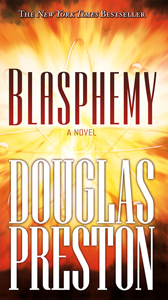Douglas Preston’s “Blaspehmy” (2008) has such a good premise that it hooked me twice. I remembered from my first read that scientists with a particle collider buried in the Arizona desert stumble upon God – or what they think is God – as they run their experiments.
I didn’t remember how it turned out, so I got pulled in again on this re-read. Unfortunately, “Blasphemy” is also one of Preston’s weaker overall novels because everything except the God discovery is overblown and less enjoyable.
God as scientific discovery
I think the God discovery plays quite well, though, especially if you know just enough about computers but not so much that you dismiss the events out of hand.
Former CIA operative Wyman Ford, now an independent investigator after “Tyrannosaur Canyon,” is hired by a government official to link up with the Isabella Project scientists and report back any oddities. Preston does a decent job establishing the personalities of these dozen scientists, from charismatic leader Hazelius to Ford’s old flame Kate, who has an appealingly up-front personality.
Ford himself doesn’t really grab me here; he’s an all-purpose protagonist ideal for insertion into any wild plot. He strikes me as morose and mundane, and it’s weird that he’s so successful with the attractive Kate considering he was described as strikingly ugly in “Tyrannosaur Canyon.”
It’s not necessarily a bad reading experience for him to be surrounded by stronger personalities, but I don’t think “A Wyman Ford Novel” is hooking anyone at this point.
Overblown conflict
I can see the gears turning as Preston struggles to create a huge conflict. Ford is sent to the Isabella site because it’s behind schedule: The scientists haven’t ramped it up to 100 percent power and reported their findings about Big Bang particles back to their federal backers.
It doesn’t ring true to me that this is a controversial project within the government or among the public. Almost all bipartisan boondoggles avoid being front-page news.
It becomes a public controversy not because $40 billion has been wasted – that ship has sailed – but for two other reasons. First, the nearby Navajo Indians have not seen the economic development promised by the project. That’s on point, but not a huge conflict; the Navajo that Ford interviews are peaceful, if P.O.’d, people.
Secondly – and this leads to the huge conflict — Pastor Eddy, a Christian missionary at the Navajo Reservation, overhears that the Isabella scientists have discovered God. He is offended, and he stirs up thousands of his fellow offendees via an email.
Cartoonish characters
Preston (and Child, in their team-ups) often uses cartoonish characters as comic relief, but “Blasphemy” is bursting at the seams with them.
I’m not saying such people don’t exist. Indeed, Preston’s portrayal of the back halls of D.C. politics – with all the slimy handshake agreements and trickery – feels disturbingly spot-on. Same with the opportunistic TV preacher who gets meticulously made up before every appearance in order to bilk more money out of his parishioners.

But for Eddy and every member of his flock to be a murderous evangelical parody is a bit much. There just aren’t that many people like this out there; indeed, Christianity’s modern track record is remarkably short on violence.
Most Christians do not go into a murderous rage when thinking about the fact that other people hold different beliefs; they embrace the peace-oriented elements of the Bible. The majority of Christians are entirely off-page in “Blasphemy.”
Crazy Christians
In response to complaints from Christian readers, the author fairly notes in the paperback’s afterword that Ford is a Christian (specifically a Catholic) and the central hero of the book.
But Eddy and his flock overpower Ford’s rationality and are the dominant force in “Blasphemy.” Their limited knowledge of a false Second Coming or an attack on Christianity is not enough that I believe thousands would converge in the desert with murder in their heart.
More than anything, though, I dislike how many pages are spent on Eddy’s bunch. Readers of P&C’s previous Southwestern novels – particularly “Mount Dragon” and “Thunderhead” – might also find that Preston is recycling some of his ideas: the isolated science enclave, the thirsty desert chases, the harrowing horse paths, etc.
Mystery in the caverns
Meanwhile, the science-and-God stuff within Isabella’s sterile caverns is fascinating. We get the expected debates about whether science and God are compatible (Preston reveals in his afterword that he believes they are), and whether science can prove the existence of God. I’m a sucker for all this stuff.
The mystery holds up, too, as God (or an AI claiming to be God) begins conversing with the scientists from the other side of a miniature black hole they’ve created in the atom smasher. It’s fun to see Hazelius, Kate, Ford and others have their every question answered by God in a way they can’t refute.
There is an out wherein this could be elaborate fakery, but Preston pulls me in so briskly that I didn’t have time to think about it. When the final reveal comes, it’s totally satisfying even if it’s not totally definitive. Readers with a robust grounding in SF literature are given a clue to solve the mystery; for those who miss the clue, we learn something fascinating.
For the final 100 or so pages of this 505-pager, it’s all action and explosions and killings and the convergence of various interests. Preston juggles it all, but there isn’t enough time to service all of the dozen scientists who were nicely described at the beginning, and inevitably we get further from what makes “Blasphemy” compelling.
The good stuff is good enough that I still recommend the novel, but it’s more out of balance than Preston’s elite works.


